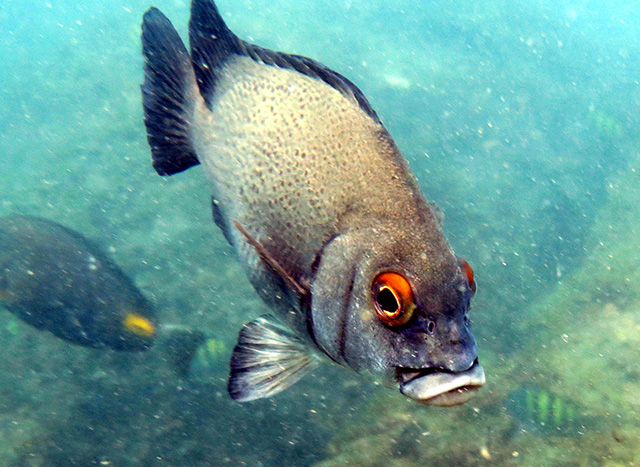| Haemulidae (Grunts), subfamily: Plectorhinchinae |
| 53.8 cm TL (male/unsexed); max.weight: 2,834.0 g |
|
benthopelagic; brackish; marine; depth range - 10 m |
| Eastern Atlantic: west African coast, from Senegal to Democratic Republic of Congo (Ref. 81655) and Angola (Ref. 7376, 57395). |
|
Dorsal spines (total): 14; Dorsal soft rays (total): 16; Anal spines: 3; Anal soft rays: 7. Diagnosis: body oblong, rather deep; dorsal profile strongly convex at level of dorsal-fin origin (Ref. 57395). Snout at least as long as eye diameter (Ref. 57395), eyes large (Ref. 81655). Mouth oblique (Ref. 57395), small (Ref. 81655) with very thick (Ref. 57395) and fleshy (Ref. 81655) lips. Chin with 6 pores (erroneously reported as 4 since original species description; Ref. 81655), but without median pit (Ref. 57395). Dorsal fin long; second anal fin spine longest and stoutest; ctenoid scales covering body and head (except snout) and interradial membranes of soft parts of dorsal and anal fins (Ref. 57395). Caudal fin rounded (Ref. 57395, 81655).
Coloration: uniformly brown, more or less dark; young individuals often with lighter spots on flanks (Ref. 57395, 81655). In small specimens (< 60 mm SL), distal part of soft dorsal fin, posterior 3/4 of caudal fin and distal part of anal fin transparent (Ref. 81655). |
| Relatively rare species (Ref. 57395). Inhabits coastal waters (Ref. 3660, 57395), estuaries and coastal lagoons (Ref. 2683). Juveniles and sub-adults often in estuaries and lagoons (Ref. 2135, 57395, 81655), in freshwater (Ref. 2135), where sexual maturation begins (Ref. 57395). |
|
Least Concern (LC); Date assessed: 15 May 2013 Ref. (130435)
|
| harmless |
Source and more info: www.fishbase.org. For personal, classroom, and other internal use only. Not for publication.
